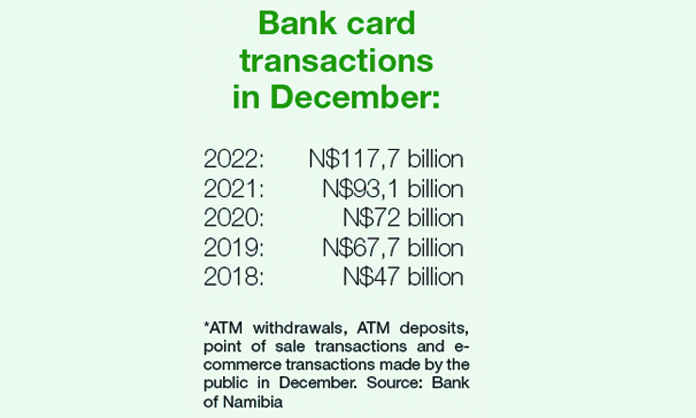Namibians are spending their money nice, nice in KeDezemba.
According to statistics from the Bank of Namibia, over the past five years there were combined bank card transactions worth N$397,5 billion during December.
In 2022, Namibians indulged in festivities with a whopping expenditure of N$117,7 billion in bank card transactions, following the trend of N$93 billion in 2021, N$72 billion in 2020, N$67,7 billion in 2019 and N$47 billion in 2018.
Holiday travel, weddings, Christmas and New Year celebrations have been identified as the driving forces behind this surge in spending.
“Namibians have demonstrated a growing trend in recent years of spending more money in December, especially on travel with their families, gifts, and celebratory occasions inclusive of mainly Christmas and New Year,” Nafimane Hamukoshi from the Economic and Social Justice Trust says.
Hamukoshi adds that the significance of family get-togethers and festivities, for example, are cultural factors influencing spending decisions.
She says variations in discretionary income, promotions and the state of the economy, all have an impact on how much people spend during the holidays.
“For a thorough understanding, it is necessary to take into account the harmony between cultural traditions and economic factors, because they have an influence on the other,” Hamukoshi says.
Muhinda Mafwila, a 35-year-old chemist, says a considerable portion of his income is usually earmarked for the unexpected expenses that tend to arise during this particular season.
As the costs of various items escalate, he acknowledges that his budget becomes more constrained.
“But you cannot ignore bad habits, so I have definitely become more mindful about my spending,” Mafwila says.
Victoria Eises, a 37-year-old nurse, says this time of the year brings about a sense of responsibility and a unique approach to ensuring that family members can enjoy the holiday season, for instance the use of shopping stamps, such as those from Shoprite. She says they are an innovative way in which Namibians manage their finances and provide for their loved ones during the holiday season.
“By collecting and pasting these stamps into books, a fund is created that can be used to purchase a wide range of items, from essential groceries to celebratory treats like alcohol, gifts for my kids and school books/supplies in January,” Eises says.
‘JANUWORRY’
Political commentator Henning Melber says some individuals often disregard their financial constraints and instead overlook their financial limitations, relying on increased borrowing and accumulating debts to present themselves within a social class that exceeds their genuine financial capacity.
“As a result, the beginning of each year marks a kind of financial hangover for many, battling to make ends meet. This is an indication that the festive season has lost its true meaning. It has become a reference point for showing off in material terms.”
Melber says holidays should be an opportunity to reflect, to consider the meaning of being alive, to take care of oneself and of others by means of true feeling and empathy.
“Putting aside time for each other should count more than material values. This is also where those living in poverty can turn Christmas into a moment of solidarity and standing together to fight the daily uphill battle.”
TIPS ON SAVING
FNB Namibia’s head of investment Erastus Tshatumbu says people should remain cognisant of their spending in order to come out strong and avoid ‘Januworry’.
He says many people get paid early in December, creating the impression that there’ll be more money to spend, however, that is not the case because there are still debit orders for December and January that need to be paid.
“List all your December and January expenses, including your home or car premiums, utilities, school fees, insurance, regular savings and so on. Put money aside for those essentials and don’t use it for anything except what it’s meant for,” Tshatumbu says.
Travelling in larger groups to capitalise on group lodging discounts and car pooling can save money on petrol costs, he says.
Bank Windhoek spokesperson Samuel Linyondi emphasises the importance of budgeting as a tool for financial success.
“A detailed monthly budget involving the family helps identify expenses and patterns, enabling adjustments for a smoother financial journey,” Linyondi says.
Strategic spending and bonus planning are crucial for navigating the festive season and ensuring a prosperous start to the new year, he adds.
Stay informed with The Namibian – your source for credible journalism. Get in-depth reporting and opinions for
only N$85 a month. Invest in journalism, invest in democracy –
Subscribe Now!







